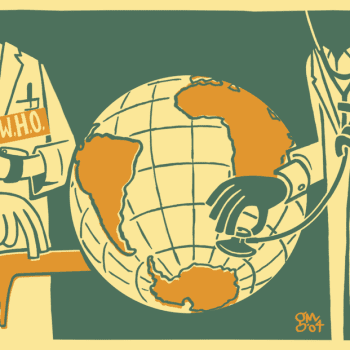In most Swedish cities, public buses don’t accept cash; tickets are prepaid or purchased with a cell phone text message. A small but growing number of businesses only take cards, and some bank offices — which make money on electronic transactions — have stopped handling cash altogether.
“There are towns where it isn’t at all possible anymore to enter a bank and use cash,” complains Curt Persson, chairman of Sweden’s National Pensioners’ Organization.
He says that’s a problem for elderly people in rural areas who don’t have credit cards or don’t know how to use them to withdraw cash.
The decline of cash is noticeable even in houses of worship, like the Carl Gustaf Church in Karlshamn, southern Sweden, where Vicar Johan Tyrberg recently installed a card reader to make it easier for worshippers to make offerings.
“People came up to me several times and said they didn’t have cash but would still like to donate money,” Tyrberg says.
Bills and coins represent only 3 percent of Sweden’s economy, compared to an average of 9 percent in the eurozone and 7 percent in the U.S., according to the Bank for International Settlements, an umbrella organization for the world’s central banks.
Three percent is still too much if you ask [ABBA’s Bjoern] Ulvaeus. A cashless society may seem like an odd cause for someone who made a fortune on “Money, Money, Money” and other ABBA hits, but for Ulvaeus it’s a matter of security.
After his son was robbed for the third time he started advocating a faster transition to a fully digital economy, if only to make life harder for thieves.
“If there were no cash, what would they do?” says Ulvaeus, 66.
The Swedish Bankers’ Association says the shrinkage of the cash economy is already making an impact in crime statistics.
The number of bank robberies in Sweden plunged from 110 in 2008 to 16 in 2011 — the lowest level since it started keeping records 30 years ago. It says robberies of security transports are also down.
“Less cash in circulation makes things safer, both for the staff that handle cash, but also of course for the public,” says Par Karlsson, a security expert at the organization.
The prevalence of electronic transactions — and the digital trail they generate — also helps explain why Sweden has less of a problem with graft than countries with a stronger cash culture, such as Italy or Greece, says economics professor Friedrich Schneider of the Johannes Kepler University in Austria.
“If people use more cards, they are less involved in shadow economy activities,” says Schneider, an expert on underground economies.
Do you think eliminating cash entirely in favor of all-electronic transactions would be a good idea?
















